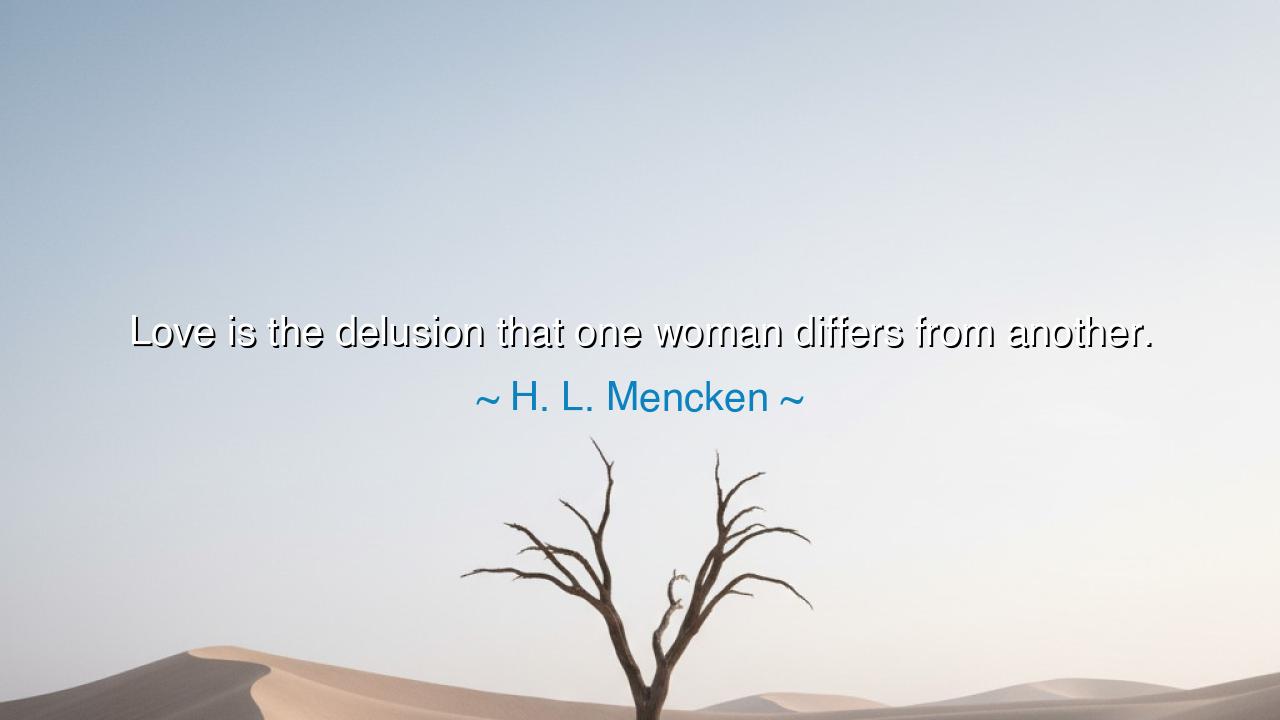
Love is the delusion that one woman differs from another.






"Love is the delusion that one woman differs from another." Thus wrote H. L. Mencken, the cynic philosopher of the modern world, whose wit struck at the illusions that men build around their passions. In this biting remark, he does not speak as a poet of romance, but as a skeptic who has gazed upon the human heart and found folly dressed as faith. His words, though sharp, are not without truth. For in them lies a timeless reflection on how love, in its blindness and intensity, transforms the ordinary into the extraordinary. It is a delusion, yes—but it is a sacred one, the divine madness through which humanity glimpses beauty beyond reason.
The origin of this quote arises from Mencken’s lifelong skepticism toward sentiment and idealism. Living in the early twentieth century, he watched a world that glorified romance, and he chose instead to expose its illusions with humor and irony. Yet beneath his sarcasm lies insight. He does not claim that love is false—only that it blinds us to sameness, to the truth that all human hearts share the same desires, fears, and imperfections. Love makes one person appear unique among all others, even though, to the detached mind, the differences are but details. In that sense, Mencken calls love a delusion—for it replaces objective perception with vision shaped by longing and imagination.
When he writes that love is “the delusion that one woman differs from another,” he speaks not against women, but against the idealization that lovers create. To love someone deeply is to see them not as one among many, but as singular, irreplaceable, eternal. Love, in its intensity, blinds the lover to the truth that every human being shares much the same nature. And yet—here lies the paradox—without that blindness, there can be no true devotion. For love is not born of reason, but of wonder; not of logic, but of vision. To the lover, one face outshines the world; one voice silences all others. This is delusion, perhaps—but it is the most beautiful one that ever touched the heart of man.
Consider the story of Paris and Helen, whose love set a thousand ships to sail and cities to burn. To Paris, Helen was not merely a woman—she was the woman, unmatched in all the earth. Her beauty, though mortal, became divine in his eyes, and for her he risked kingdoms and glory. Was it madness? Certainly. Was it delusion? Indeed. But from that delusion was born legend, poetry, and the eternal reminder that love has power enough to move the fate of nations. Mencken, in his wisdom or his weariness, saw this truth: that love distorts the senses, yet also gives life its passion and poetry.
Love as delusion is not merely folly—it is necessity. If all men and women saw each other only as interchangeable forms, life would lose its color, and affection would vanish into indifference. The delusion of love—the belief that one heart differs from all others—creates meaning. It is the illusion that transforms attraction into devotion, companionship into destiny. Thus, what Mencken calls delusion, the mystics call vision: the ability to see the divine spark in a single soul. For love’s illusion does not make the world smaller; it makes it infinite. It is through loving one that we learn to glimpse the sacred in all.
Yet Mencken’s cynicism also carries a warning. When the delusion fades—when the glow of infatuation gives way to the sober light of reality—many lovers despair. They discover that the beloved is not an angel, but a human being, flawed and familiar. Those who mistake delusion for truth will fall into bitterness; but those who understand that love’s blindness is part of its beauty will grow into maturity, learning to love not because the other is perfect, but because they are real. True love begins when the delusion ends, and devotion remains.
So, my listener, hear this paradox as wisdom, not mockery. Love is delusion—but it is the divine delusion that gives life its fire. Do not seek to destroy it; instead, temper it with understanding. Love deeply, even knowing you are bewitched; but let your affection evolve from fantasy into compassion. See the beloved not as different from all others, but as a reflection of the shared humanity that binds us all. In doing so, you will rise from Mencken’s irony to truth: that though all people are made alike, love makes each one sacred in our sight.
For in the end, Mencken’s jest hides a revelation: it is not that love blinds us to sameness—it opens our eyes to meaning. It teaches us that within the universal lies the unique, within the ordinary, the miraculous. And if that is delusion, then may we never be cured of it—for it is the sweetest madness that ever graced the heart of humankind.






AAdministratorAdministrator
Welcome, honored guests. Please leave a comment, we will respond soon